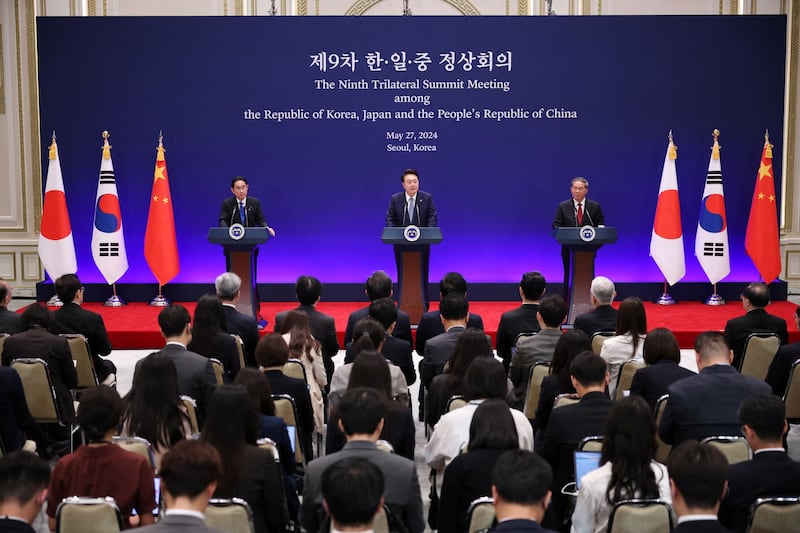Updated 27 May, 2024, 07:07 a.m. ET.
Leaders of South Korea, Japan and China reaffirmed their commitment to pursuing the denuclearization of the Korean Peninsula during a summit in Seoul on Monday, hours after the North announced a plan to launch a satellite.
President Yoon Suk Yeol, Japanese Prime Minister Fumio Kishida and Chinese Premier Li Qiang reached the agreement after the North notified Japan of its plan to launch a space rocket carrying a military spy satellite sometime before June 4.
“We reiterated positions on regional peace and stability, denuclearization of the Korean Peninsula and the abduction issue, respectively. We agree to continue to make positive efforts for the political settlement of the Korean Peninsula issue,” the three leaders said in a joint declaration.
“We reaffirmed that maintaining peace, stability and prosperity on the Korean Peninsula and in Northeast Asia serves our common interest and is our common responsibility,” they added.
North Korea condemned the summit declaration as a “grave political provocation and sovereignty violation.”
"To discuss the denuclearization of the Korean peninsula today constitutes a grave political provocation and sovereignty violation that totally denies the DPRK's inviolable sovereignty and constitution reflecting the unanimous will of all the Korean people," North Korea's foreign ministry spokesman said in state media. He was referring to the North by its official name, the Democratic People’s Republic of Korea.
At the summit in the South Korean capital, Yoon and Kishida denounced the North’s planned satellite launch as a violation of U.N. Security Council resolutions that ban its use of ballistic missile technology.
“The international community must respond firmly,” Yoon said during a joint press briefing.

Yoon’s concerns were echoed by Kishida.
“If it proceeds, it will be a violation of U.N. Security Council resolutions. We strongly urge North Korea to cease this activity,” he said.
China’s Li called on all “related countries” to exercise restraint to mitigate tensions, without referring to North Korea directly.
“China has consistently worked to promote peace and stability on the Korean Peninsula and is pushing for a political resolution to the peninsula issue. Relevant parties should exercise restraint and prevent the situation from worsening and becoming more complicated,” Li said during the briefing.
“Korea, Japan and China should properly handle sensitive issues and conflicts, consider each other’s core interests and significant concerns, and practice genuine multilateralism to jointly safeguard stability in the Northeast Asian region,” he added.
North Korea notified Japan of its plan to launch a satellite on the eve of the trilateral gathering, the first the leaders of South Korea, Japan and China have held since 2019.
Japan’s Cabinet Secretariat said on Sunday that North Korea had informed it of plans to launch a rocket carrying a satellite before June 4, the Kyodo News Agency and Japanese public broadcaster NHK reported.
The North designated three areas where debris will fall -- two west of the Korean Peninsula and the other east of the Philippine island of Luzon, according to the reports.
Last week, the South Korean military said it had detected signs of Pyongyang preparing for a military spy satellite launch at a site on its west coast.
North Korea, which has conducted six nuclear tests, launched its first military reconnaissance satellite in November and has made public a plan to launch three more this year.
The trilateral session focused on promoting cooperation in six key areas: economy and trade, sustainable development, health issues, science and technology, disaster and safety management, and people-to-people exchanges.
The leaders also agreed to formalize the trilateral cooperation by holding regular summits and ministerial meetings.
Monday’s session marked the first three-way meeting since December 2019, following a prolonged suspension due to COVID-19 and historical disputes among the Asian neighbors.
Edited by Mike Firn.
Updated to add North Korea's reaction.
